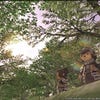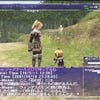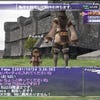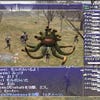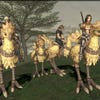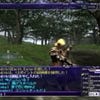Retrospective: Final Fantasy XI
Vana'diel or no deal.
Today, things are much improved. A level-syncing system was put in place some time ago, allowing players to synchronise their levels (gear drops its stats proportionally to compensate) to one member of the party, so a level-10 player can complete quests with level-75 friends. It's a great idea, one of many which populate the game. I'd have given a limb - well, perhaps a digit - for it seven years ago. Today, most people I know have moved on to other games, but it's still a nice system.
Scratch the surface of FFXI, and you start to find countless brilliant ideas. The game made no bones about being heavily influenced by EverQuest, but it also dug deep into Final Fantasy's history for its ideas. The Job system is inherited from Final Fantasy III, and forms the core of the game, replacing character classes in other MMORPGs. It's superb, still arguably unmatched in its utility and a pleasure to tinker with.
You start out your character as one of six basic jobs, and at level 30 you unlock quests, which give access to more specialist jobs - everything from Samurai and Ninja through to piratical Corsairs, elegant Dancers and one of the more recent additions, the somewhat maligned Puppetmaster. Each expansion pack has introduced a few new jobs, and a character can play any number of these, switching between them at your "Mog House", a personalised home in your chosen city. High-level players treat the number of jobs they have maxed out as a badge of honour.
Even more interestingly, at level 18 you gain the ability to set a "support job" - a role which will grant some of the abilities and boons of a second job to your presently equipped main job. Your support job is maxed out at half the level of your main job, but gives huge flexibility to the system, with different combinations often yielding very differently balanced characters.
Beneath this over-arching system, various other statistics keep ticking away. Like any MMORPG worth its salt, FFXI is a complex clockwork assembly of various figures, counters and cool-downs, all of them working in concert to keep the game interesting and challenging - with the focus here definitely being on the challenging side of that equation.
Yet the face the game presents to the world couldn't be more different. Final Fantasy XI, more than any MMORPG before or since, is a game about stories. Many MMOs are content to let players tell their own stories. Some, like WOW, build elaborate worlds but are happy for players to skip all the quest text and ignore the lore if they wish. FFXI, however, is at heart an exercise in storytelling, a game made by a company whose finest creative moments have always laid on the borderline between games and interactive narratives.
As such, the game is littered with cut-scenes, establishing the world and its characters by regularly taking the camera out of your hands and allowing events to unfold around you. Some gamers recoil as if they've been bitten at such a concept. Others are content to let great storytellers tell great stories, and on occasion, that's what FFXI manages to do.
Characters introduced in the narrative over the years have become firm favourites, enjoying a status among players which no NPC in World of Warcraft has ever managed to achieve. Quest chains are treated as serious exercises in storytelling, developing casts of characters, employing dramatic twists and turns, and usually punctuated with epic set-pieces.
We make our own stories, too. Square Enix (as it became) has said that keeping the world's population on one set of servers saved a lot of money, but it also built a unique community. Distinct groups played in distinct timezones, but there was overlap, and a translation system that let us all communicate, at least in a rudimentary way. Some players kept to their own countrymen. Others formed lasting friendships across continents.
And me? What's my story? Even after seven years, there's an allure to FFXI, a world which invites you to explore more, a game system which beats you black and blue but makes you feel like you'll achieve something worthwhile, just as soon as the bruises heal. Yet I feel like I'm returning to the scene of a crime. I walked back into my local indie store a few days later and ordered three more copies, a task I'd repeat several times in the coming weeks.
I stopped playing less than six months later, without reaching the level cap. I returned briefly, played long enough to hit the cap and try a few dungeons, and then quit again. Those whom I'd introduced to the game, whom I'd bought copies for, persuaded to give it a try - they stayed. I felt like a reformed drug dealer, having turned over a new leaf, walking down a street and witnessing the lives of those whom I'd started down the path of addiction.
I think, now, that I know how it is. FFXI is powerful stuff. It's even, in the final analysis, a great game - a beautiful, intriguing, mysterious and captivating experience. For me, however, it belongs in my memories. I've finished writing this article; with a little sadness, a little reluctance, I'm going to go and uninstall it now.


